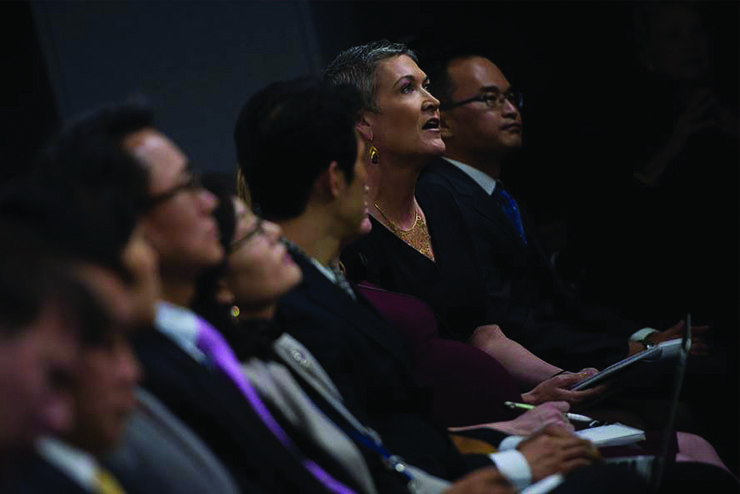The late sixties and early seventies were great years for yours truly. The great President Nixon was in the White House, I had my sporting successes in tennis and karate, and my journalistic career got a boost when I reported from Huế, Vietnam, for National Review’s William F. Buckley, Jr.
That’s when Bill, a very good friend, decided Paris would be a safer place for an eager young Taki to make his name. There was another reason why Bill picked the City of Light as my base. The young Austrian princess Alexandra Schoenburg and I were tripping the light fantastic in Parisian nightclubs, and I had introduced her to the Buckleys. She had asked Bill for no more Vietnam assignments.
At that time, The New Yorker’s longtime Paris correspondent Janet Flanner wrote an opus called “Paris Was Yesterday.” Bill thought an article from me called “Paris Really Was Yesterday” would be a hopeful upgrade. I can’t resist telling this tale one more time. It illustrates the kindness and total lack of self-worship—so rare in today’s celebrities—of a wonderful writer named James Jones. For any whippersnappers unfamiliar with Jones, he wrote the novels From Here to Eternity and Some Came Running, both bestsellers and very successful as movies, and many other novels.
Jones and his family had lived for years in a grand house on the Left Bank in Paris, but rumor had it that he was returning to America. He was the perfect interview subject to tell me why Paris was “yesterday.”
Jones was a close friend of Irwin Shaw, another terrific storyteller, author of best sellers like The Young Lions, Two Weeks in Another Town, Evening in Byzantium, Lucy Crown, Rich Man, Poor Man, and some extremely good short stories such as “The Girls in Their Summer Dresses,” “The Eighty-Yard Run,” and “Tip on a Dead Jockey.” I had skied and played tennis with Irwin, who had encouraged me to write, but I could not contact him to get an introduction to Jones.
So, on an evening I’ll never forget, I drove by Rue de Berry where the old International Herald Tribune newspaper was based, dropped a jeton in the phone, and rang Jones. A gruff voice answered.
May I speak with Mr. Jones, please?
I’m Jones.
Mr. Jones, my name is Taki Theodoracopulos. I work for William Buckley’s National Review and would like an interview with you.
I do not give interviews, sorry.
Not as sorry as I am, sir, as I just got back from Vietnam and have a wife and three children to feed on 8,000 dollars per year. An interview with you would help a lot.
Jesus. Who did you say you work for?
William Buckley’s National Review.
God help us. You better come around.
And so I did. Jones was wonderful. He had had enough of Paris, was not in good health, and was eager to go home. France’s student revolt of May 1968 had ended the carefree glamor that had lured the chic and the intellectuals to Paris since time immemorial. America was the new place to be.
Jones didn’t talk about himself or his work but mostly about what Paris meant before and then, especially to American expatriates like himself. He was generous and kind as he tried to explain that the Paris of Papa Hemingway, Ezra Pound, and F. Scott Fitzgerald was no more. He said he had tried to live the dream but it was all over. Paris was just another city in trouble.
As I was leaving, his wife came in and asked if there was anything they could do for a poor journalist like me. Slightly embarrassed, I thanked them profusely and left. I then wrote the story and telexed it to National Review.
Some time later, Time magazine ran a cover story with the headline announcing the death of the novel. Irwin Shaw and the Joneses discussed it as they dined in a Parisian bistro. “Who the hell do they think they are?” asked Irwin. “We are storytellers and we will always tell our stories. To hell with Time!” With magazines the subject at hand, James remarked that he had just met a kid with a long Greek name “who makes just 8,000 a year working for Bill Buckley’s fascist rag.”
“Funny,” Irwin said, “the only Greek I know who writes is Taki Theodoracopulos.”
“Yes, that’s the one,” said James.
Laughing in his drink, Irwin informed Jones that Taki was not so poor and would soon take him sailing on his yacht in the South of France. Jones cursed and slammed his fist on the table. “I’ve been had by a Fascist!”
Years later, I attended a Southampton party in honor of Irwin, who was towards the end of his life. James Jones had already died. Mrs. Jones approached me as I was talking to Irwin, who was laughing about the incident. “You never fooled me for a minute,” said Mrs. Jones. I’m not so sure. ◆

Leave a Reply